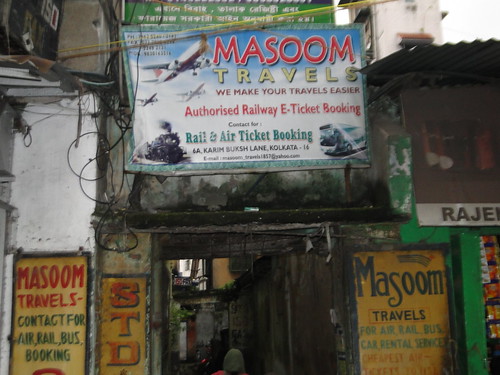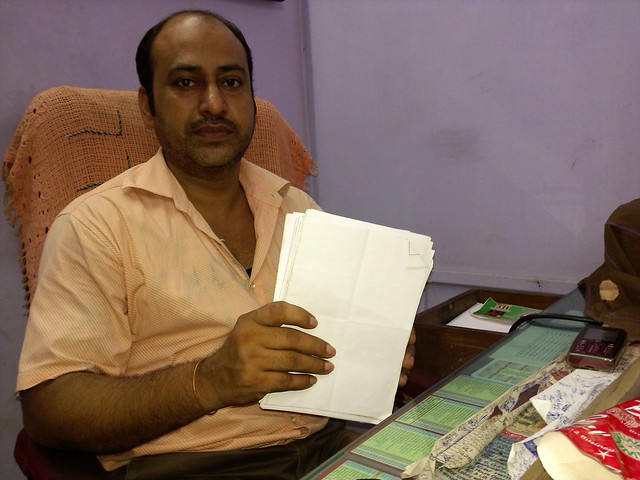This is the last in four parts series on “Terror tale: The strange case of Akhlaque Ahmed Khan,” which is one of the many such intriguing cases where Muslim youths were arrested on mere charges and are damned to spend their youthful years behind bars as under trials.
Read Part I here: Over 14 years as undertrial on charges of conspiracy to wage war
Read Part II here: Similar charges slapped in Delhi and Kolkata
Read Part III here: The strange case of Akhlaque Ahmed Khan: Loose ends
By M Reyaz, TwoCircles.net,
New Delhi/ Kolkata: Akhlaque Ahmed Khan was not granted bail ever in the Delhi case (he was subsequently acquitted in 2006), he was granted bails in both the cases that were filed against him in Kolkata.

File photo of Akhlaque Ahmed Khan (Courtesy: ToI).
On mere charge of alleged conspiracy to ‘wage war against the government’ an accused is languishing in jail for over 14 years. The story of Akhlaque Ahmed Khan of Kolkata is one of most intriguing, for in the same month in January, 1999 he was made co accused, along with Syed Abu Nasir of Bangladesh and others in two terror cases – one in Kolkata and other in Delhi.
While in October, 2006 Akhlaque was acquitted from the Delhi case, he is still languishing in Kolkata’s Presidency Jail as an under trial in connection with the Kolkata case. What is more intriguing is that he is behind bar, although in the same case the Chief Metropolitan Magistrate (CMM) had granted him bail way back in April, 1999 as he had failed to furnish the security bond on time.
In the first case, in the Alipore court, he was granted bail and later discharged from the case as Police failed to file any charge-sheet against him.
As the Police had failed to file the charge-sheet within three months in the ongoing case too, after serving the statutory 90 days period Akhlaque was given the bail order in April 1999, along with two other co-accused Abdullah Salafi, Mritunjoy Das who are since out on bail, on security bonds of Rs 10,000.
However, as Akhlaque was anyway not granted bail in the Delhi case and was in Tihar Jail, his counsel advised Akhlaque’s family “to wait for his bail/acquittal in the Delhi case, as he would not be freed even after furnishing the bail bond.” The counsel suggested that the bail bond could be deposited even later.
After his acquittal in the Delhi case in October 2006, however, as the counsel of Akhlaque approached the Calcutta court, they were faced with what his youngest brother Azad Ahmed Khan describe as “harrowing experiences”. They had to run from pillar to post, literally, seeking permission to furnish the bail bond, says he, but to no avail.

The dilapidated entrance of Masoom Travels.
As the charges were already framed in the said case and it was transferred to the session court for trial, the Chief Metropolitan Magistrate (CMM) said that it now has “no jurisdiction to pass any order” over the case.
This was a case, in fact, where even the learned public prosecutor Ashoke Bakshi on November 22, 2006 had rebuked the honorable court and had “supported the contention of the advocate for the petitioner and submitted that the order of bail dated 16.4.1999 is still in force and therefore, the learned CMM has committed wrong in refusing to accept the bail bond.”
In fact he had suggested that the order of bail should be confirmed by the Court of Session and the learned CMM should be directed to accept the bail bond in terms of the order dated 16.4.1999.”
The fast-track court session court, where his case was being heard, however, observed that the petitioner’s right to be released on bail “stood extinguished on filing of chargesheet on 15.01.2002…As the accused who was directed to be released on bail did not furnish the bail bond after the order was passed and remained in custody, he cannot claim the execution of the said order by furnishing bail after filing of the charge-sheet and commitment of the case to the Court of Session.”
On suggestion of the senior lawyers, Akhlaque had then approached the Cacultta High Court for quashing of charges under 120B/121/121A/122 and other such serious charges relating to criminal conspiracy of waging war against the government and pleaded that he was discharged from the Bhawanipur case (which was pursued in Alipore court) and also acquitted from the Delhi court on similar charges. The defence counsel had said that if some forged documents were at all found, the accused may be tried for forgery.
The Calcutta HC had, however, discharged the revisional petition for quashing of the proceeding arguing that the Delhi court’s disbelieving the claim of the prosecution “cannot be a ground for disbelieving the prosecution case, so far as the present case is concerned.”
In fact from CMM to Session Court to the HC, Akhaque’s bail plea was repeatedly rejected considering the ‘seriousness’ of the charges, even when his mother fell very sick. Akhlaque was not allowed a parole even when his mother died on June 28, 2009.

Azad Ahmed Khan, brother of Akhlaque
The trial is still on in a fast track court, and consequently Akhlaque awaits his fate.
Post-script: This is not the first of its kind case though. In January 2012, Md Amir Khan finally walked free, after he was acquitted in almost 20 cases, but only after spending 14 years in jail. TwoCircles.net was the first news portal to highlight his plight. Kanpur based 42 year old Syed Wasif Haider was in jail for over eight years in several cases from August 4, 2001 to August 12, 2009 when he was finally acquitted from all cases.
Police have made goof ups in Mecca masjid, Malegaon and in several such cases, raising serious questions on whole anti-terror operations. However, what is surprising is that, while the Left leaders have been vocal against such police atrocities in Delhi, on face of it, it appears that even their own backyard was not clean (till April 2011 Left Front was in power in West Bengal.)
Related:
Terror tale from WB: 2 Muslim youths languishing in jail without chargesheet for 5 years

